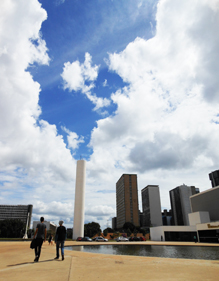|
Getting your Trinity Audio player ready...
|
 The fight against corruption needs a practical, integrated approach that includes governments, private sectors and civil society working together – that was one of the main messages coming out of a recent session at Transparency International’s 15th Anti-Corruption Conference taking place in Brasilia, Brazil, from 7 to 10 November.
The fight against corruption needs a practical, integrated approach that includes governments, private sectors and civil society working together – that was one of the main messages coming out of a recent session at Transparency International’s 15th Anti-Corruption Conference taking place in Brasilia, Brazil, from 7 to 10 November.
Corruption Watch has been sponsored a place at the conference by the German government and will be bringing updates from the event as it unfolds.
The discussion, titled Global solutions against corruption, included speakers Madgy Martinez-Soliman of the UN’s Bureau for Development Policy, Sir Ian Andrews of the UK’s Serious Organised Crime Agency UK, Elaine Dezenski of the World Economic Forum's Risk Response Network, Ursula Muller of Germany’s Federal Ministry for Economic Cooperation and Development and Richard Boucher of the International Organisation for Economic Cooperation and Development.
Setting up a business in a developing economy can be fraught with loopholes and complications and this makes it an ideal environment for corruption to fester.
“If an entrepreneur with a great idea needs to spend six months navigating a maze of red tape to get his or her business up and running, that has created the opportunity for a bribe to become almost inevitable,” said Martinez-Soliman.
“We must make paperwork easy and bribery difficult – not the other way around,” he added.
Cleaning countries of corruption is easier done one sector at a time, a strategy which Martinez-Soliman refers to as “generating islands of decency”.
The secret arsenal here is a “coordinated government agency with the required mandate, skills set and institutional capacities”. But an organisation such as this won’t achieve much without the necessary backing.
“Success has happened in countries where there has been support from high and low – from the president to the individual citizen.”
Accessing research and statistics on corruption trends is one way countries can become more aware about unscrupulous practices in their economies – and awareness is the first step in finding a solution.
The World Economic Forum (WEF) has identified corruption as one of the three major global risks that need attention from both government and business leaders, said the organisation’s Elaine Dezenski.
WEF’s Global Competitiveness Reports, which assess the economic environments of more than 100 economies worldwide, can be used as an indicator of corruption in countries, Dezenski added.
“In the 2012 report, 58% of respondents from 144 countries listed corruption as one of the top five impediments in doing business, while 22 countries rated corruption as the top impediment – this is up from 15 countries three years ago. This begs the question: are things getting worse?”
Dezenski further noted that the top 10 most competitive nations in the 2012 report were also among the least corrupt.
Switzerland tops the list as the most competitive, followed by Singapore (2nd), Finland (3rd), Sweden (4th), Netherlands (5th), Germany (6th), US (7th), UK (8th), Hong Kong (9th) and Japan (10th). South Africa came 52 out of the 144 countries surveyed.
Richard Boucher of the International Organisation for Economic Cooperation and Development (OECD) said the global financial crisis has spurred movements that are demanding more accountability from governments – these include Occupy Wall Street and the Arab Spring.
The OECD has initiated a global anti-bribery convention that sets out legally binding standards to reduce corruption in international business transactions. South Africa and Brazil, although non-member countries of the OECD, have adopted the convention, as have Argentina, Bulgaria and Russia.
“We’re in a very difficult time now in the global economy. Because of the financial crisis, inequality is up and one of the reasons for this inequality is corruption. Fighting corruption helps us to deal with that inequality to make growth possible. Governments must look after everybody – not just the privileged,” he said, adding that the cross-border sharing of information – including best practices, peer reviews and policies on integrity, corporate governance and procurement – was key in the fight to make governments more transparent.
Image

Excerpt
The fight against corruption needs a practical, integrated approach that includes governments, private sectors and civil society working together – that was one of the main messages coming out of a recent session at Transparency International’s 15th Anti-Corruption Conference taking place in Brasilia, Brazil, from 7 to 10 November.
File Upload



